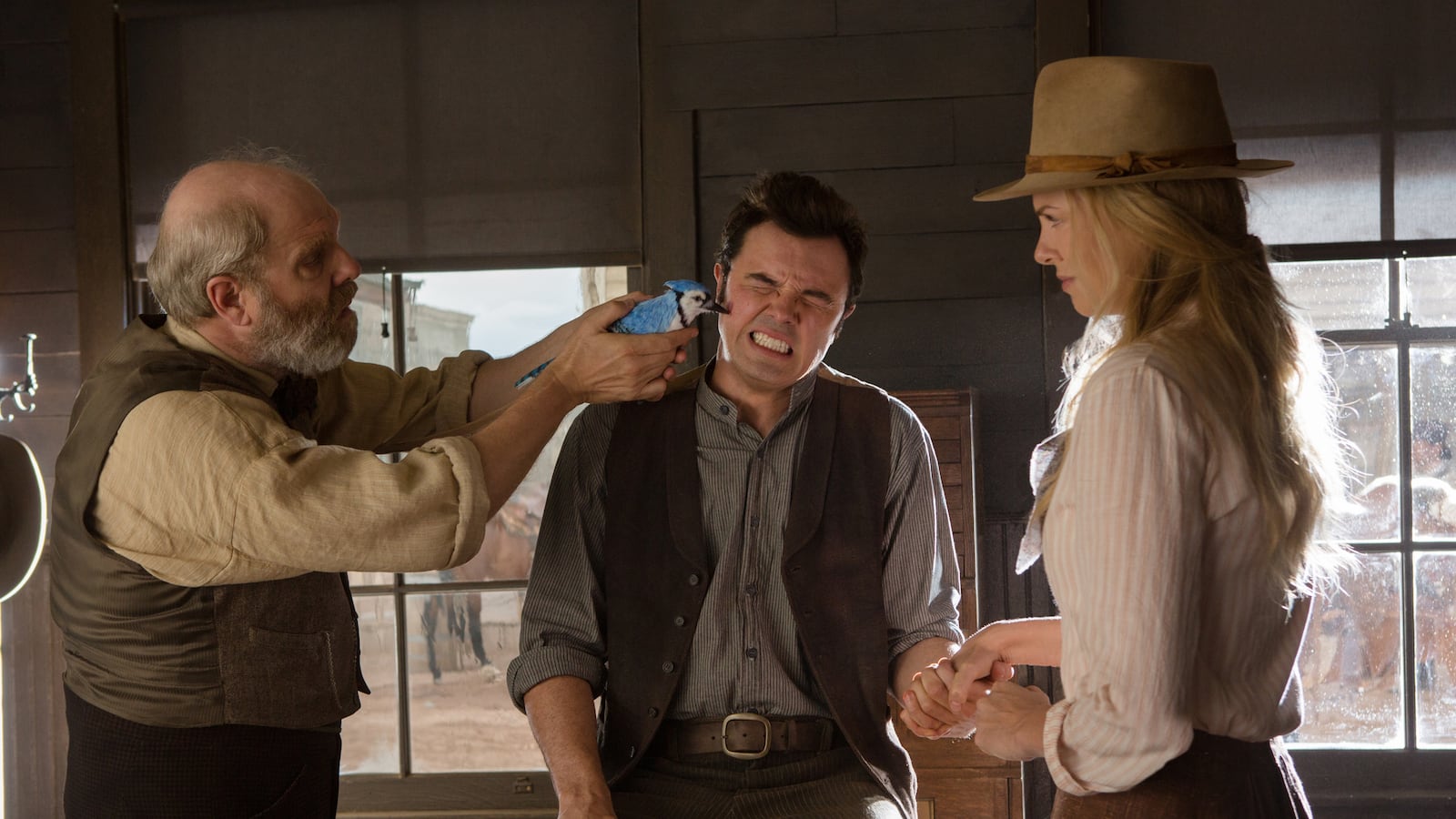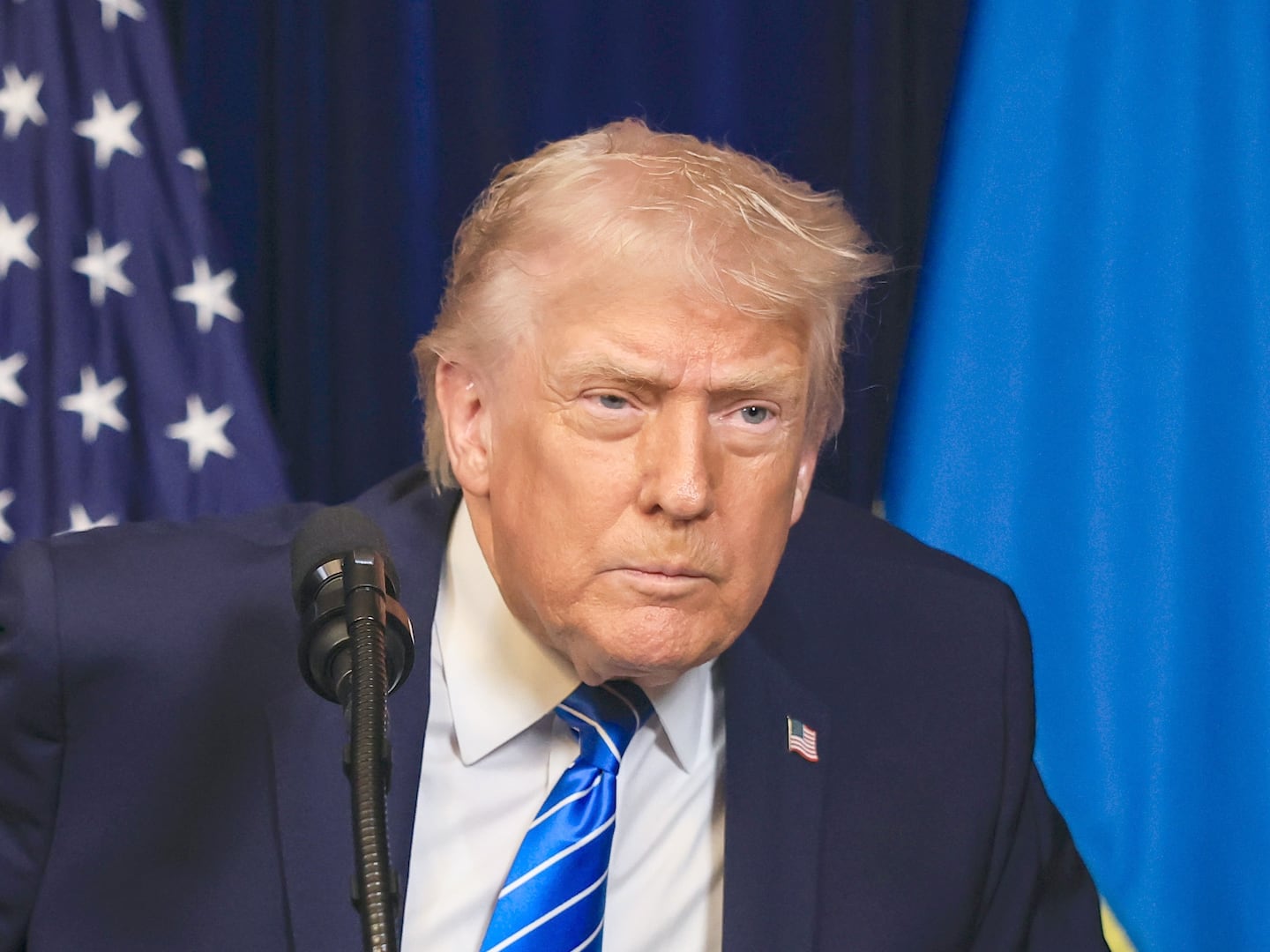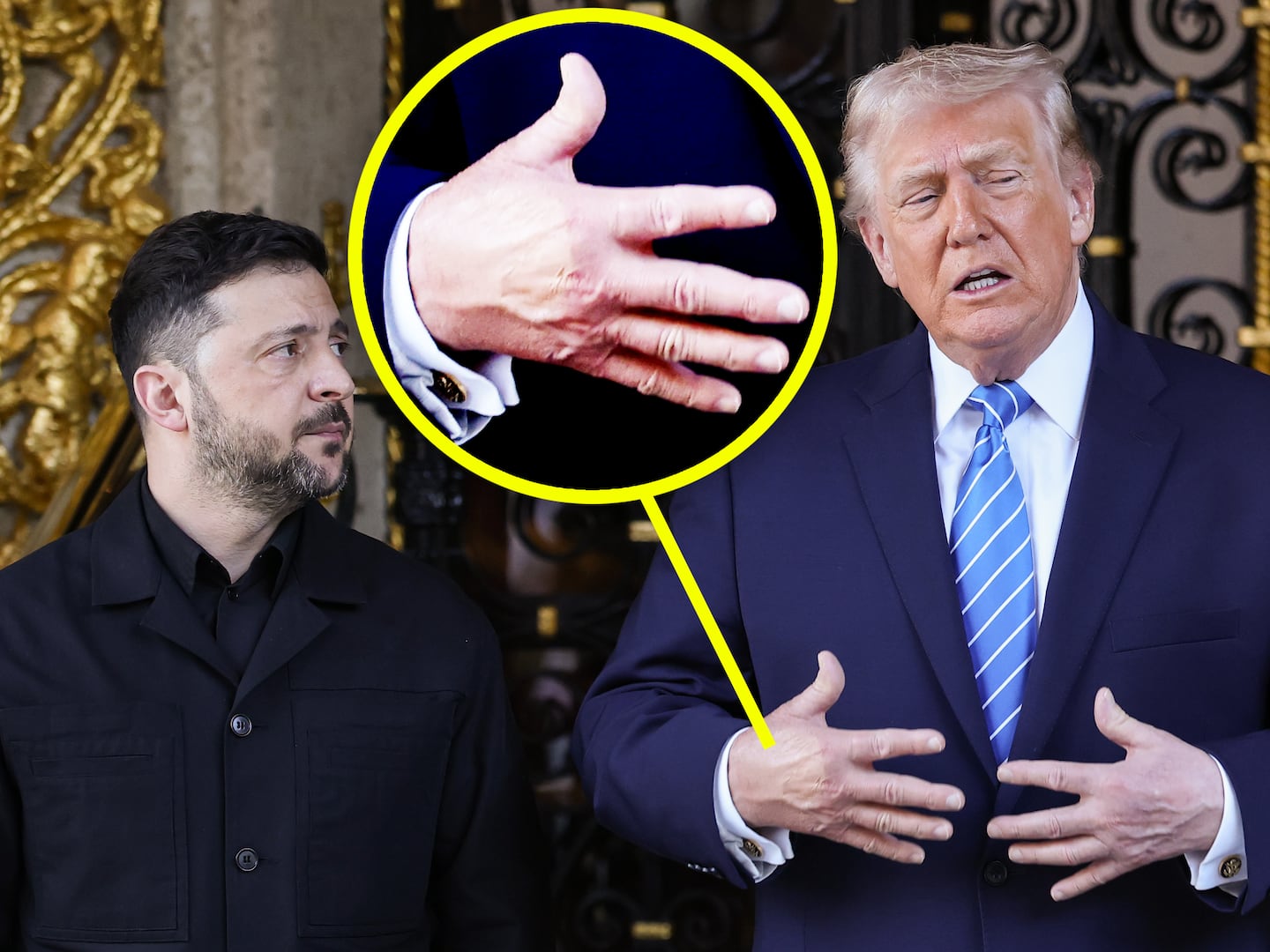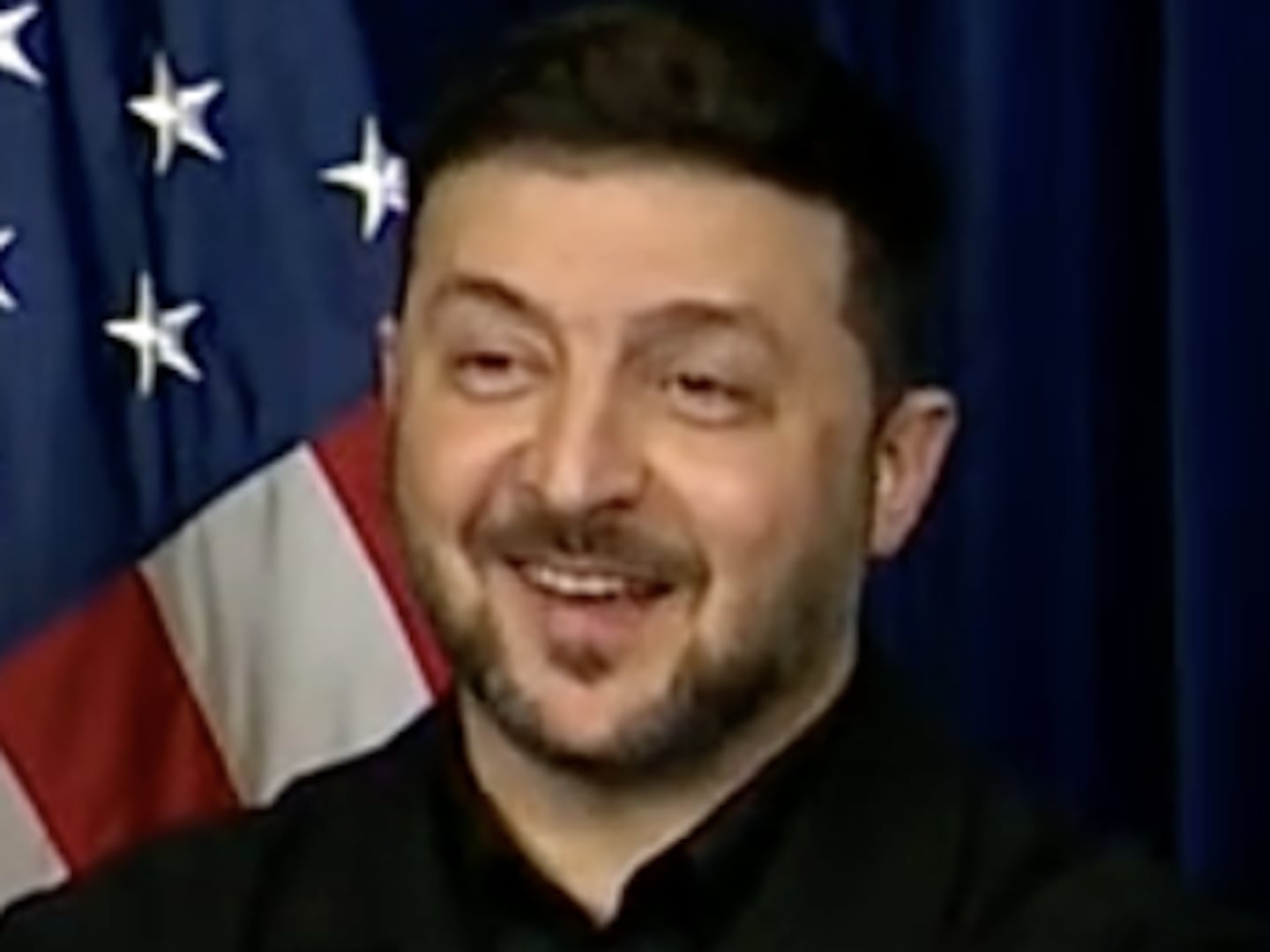The fact that A Million Ways to Die in the West isn’t funny is, frankly, not too shocking. The fact that anyone expected it to be is. The film relies on a steady stream of gross gags and outdated shtick. The content of the comedy isn’t “funny”—which makes sense, since the leading man isn’t really an “actor.”

Watching Seth MacFarlane unconvincingly deliver his own shoddy material while somehow managing to woo the brave and beautiful Anna (Charlize Theron) feels like an uncomfortable intrusion into his inner fantasy world. In this magical dreamscape, a few well-timed fart jokes and some unearned confidence is all you need to carry a feature film, and the uncharismatic comedian is the real heartthrob. It’s easy to dismiss this worldview as narcissistic, un-self aware, and farcical. But that’s not exactly true—after all, people are paying to see A Million Ways to Die in the West (well, some people). MacFarlane is actively making money off of his inflated sense of self.
To make matters worse, the comedian’s much-lauded sense of humor consistently works at others’ expense. MacFarlane’s male fantasy extends far beyond starring in a blockbuster and getting the girl; like most adolescent male fantasies, it oversimplifies the women it commodifies. The gun-toting Anna is clearly MacFarlane’s attempt to create an exemplary, three-dimensional female character. Unfortunately, Anna’s female empowerment, much like her weapon, is merely an accessory. The film culminates with Anna being held at gunpoint, giving Albert (and MacFarlane) the chance to finally become the hero of his own Western. Anna, whose character held so much promise, is reduced to a toy for boys to fight over, in a misguided attempt to prove that they are men.
Since Albert is little more than MacFarlane in an old-timey outfit, it’s safe to say that Theron, like the movie itself, is just a means to inflating MacFarlane’s ego. Call it adolescent humor or male privilege: either way, MacFarlane’s work has consistently exhibited a complete lack of regard for women, a worldview that’s as outdated as it is offensive. And we, the entertainment consumers, are actively funding his ignorant, casually misogynistic content.
The 1999 premiere of Family Guy, a dirty primetime cartoon a la The Simpsons, launched Seth MacFarlane into the comedy stratosphere. American Dad!, another similar cartoon creation, quickly followed. These shows were wildly successful, transforming MacFarlane from a young cartoonist into the highest-paid writer in television, and a household name to boot. Part of Family Guy’s inarguable appeal was its subversive sheen. Cartoon characters acting abhorrently is inherently shocking. The very act of telling an adult joke in a child’s medium is already a punchline. Sure, The Simpsons had long before broken ground on this comedic territory—but by digging even deeper, bulldozing over the rules of political correctness and reaching new highs (lows?) of obscenity, MacFarlane artfully constructed a façade of cutting edge.
But MacFarlane’s “bold” comedy remains shockingly retrograde, particularly in its treatment of women and gender relations. Peter Griffin stars as the show’s bumbling patriarch, an old-fashioned kind of everyman who expects his wife to cook, clean, and shut her mouth. We’re expected to understand that this is obviously a parody. Seth MacFarlane totally gets it—patriarchal societal norms are passé, and Peter’s misogynistic worldview is in fact a form of subtle satire. But here’s the thing: simply reciting homophobic slurs and employing racism and misogyny isn’t cultural commentary. In order to satirize, you have to actually say something. Without context, subtlety, and commentary, a parody begins to look eerily like the scenario it is attempting to skewer.
Take, for example, Family Guy’s myriad of allusions to domestic violence and abuse. In Season 2’s “Da Boom,” Peter suspects that his wife, Lois, is pregnant, so he pushes her down the stairs. The whole gag is over in a matter of seconds; this “joke” isn’t a subtle critique of the way we talk about assault, or a daring attack on political correctness. The only thing this gag is doing is asking us to laugh at the image of a woman being pushed down some stairs. As Rebecca Loar notes, “All we really learn from Family Guy is that images of violence towards and subjugation of women are good for a quick laugh. The images tend to be followed by an equally non-contextual eighties reference and nothing more is said. In short, the motif of the show does not serve to ‘controversialize’ these images but to normalize them.”
This blatantly offensive material is sold as bold, funny, and edgy—if you don’t “get Family Guy,” or you dare to be disturbed by its message, you’re behind the times. Never mind that the patriarchal belief system woven throughout the cartoon content is itself shockingly outdated. If you don’t think a random portrayal of domestic violence is cutting edge and hilarious, then you’re probably a whiny, humorless woman, just like Lois! Maybe women should just leave comedy to the menfolk, and stick to nagging!
At the end of the day, of course, Family Guy isn’t really the problem—it’s the outdated, but still prevalent sensibilities that lie at the heart of the show. Family Guy is an incredible illustration of how male privilege is still the norm. We still live in a world where a man is gifted with the ability to write a joke about a beaten woman, with no cultural context or intelligent commentary, and be praised for innovation, as opposed to ignorance. A cultural climate where MacFarlane can casually allude to a subject that is personal and relevant to women worldwide, and not only fail to be punished or chastised, but instead rewarded. Family Guy, with its bold ignorance and unabashedly adolescent content, is a sort of refuge in an entertainment world that’s quickly evolving, opening itself up to more diverse world views and subtle and nuanced forms of sociopolitical commentary.
It’s an animated world where men still reign supreme, and women are nothing more than nagging foils, or readily available punchlines. It throws back to the days when men produced entertainment content almost entirely for other men; content that either objectified women or ignored them altogether. Of course, our zeitgeist is constantly changing, and arguably growing out of the entrenched misogyny that MacFarlane so casually perpetuates. But his continued success, accompanied by a silent acceptance of the outdated worldview he masquerades as comedy, speaks to the fact that the entertainment industry, like MacFarlane himself, still has a lot of growing up to do.
MacFarlane’s graduation from casual to blatant misogynist at the 83rd annual Academy Awards is well documented. But too little has been said about the fact that he was offered this prestigious gig in the first place. At this point in his career, MacFarlane was almost exclusively famous for his animated hits. He had little experience performing in his own right, which implies that he was chosen due to his assumed writing abilities. These “abilities” manifested themselves in such gems as “We Saw Your Boobs,” a punchy musical number that recalled films in which actresses appeared naked. Never mind that the entire point of the Oscars is to celebrate masterful performances—according to MacFarlane, a woman’s body is always infinitely more interesting than her talent. As Margaret Lyons writes, “This wasn't an awards ceremony so much as a black-tie celebration of the straight white male gaze.”
MacFarlane’s approach to hosting the Academy Awards was the worst, for a whole bunch of reasons. In addition to objectifying the very women the Oscars is designed to congratulate, he alienated a huge contingent of his viewers, essentially warning them that if they don’t like boobs, then they might as well change the channel. Why was a man whose entire sense of humor is unabashedly tailored to the sensibilities of other men asked to host Hollywood’s biggest night of the year? Was it because last year 77 percent of Academy voters were male? Or because the entertainment industry remains convinced that young men are the only worthwhile consumer group to court when it comes to comedy, despite all evidence to the contrary? (Bridesmaids, anyone?)
Whatever the reason, the fact is that an Oscars host who doesn’t blatantly dismiss and disregard over half of the award show’s viewers doesn’t seem like too much to ask for. Entertainment institutions like the Academy have a duty to use their clout wisely. There’s simply no excuse for giving MacFarlane a platform from which to offend on a global scale. While misogyny has long been the norm in the entertainment industry, the routine nature of this brand of comedy doesn’t make it okay, and it certainly doesn’t justify its perpetuation.
Despite the widespread backlash to his Oscar’s performance, MacFarlane remains a beloved comedic figure, who promises to continue producing content for years to come. Some of these projects will be more critically acclaimed than others, but they are all bound to feature that characteristic MacFarlane sensibility: deplored as misogynistic and offensive to some, but celebrated as hilarious, bold, and raunchy by others. Whether or not you find Seth MacFarlane funny is a matter of personal opinion—but why is no one publically asking this question? While A Million Ways to Die in the West has largely garnered abysmal reviews, critics appear to be treating it as a flop from an otherwise laudable talent. Entertainment Weekly called MacFarlane a “quick-draw satirist,” while the Los Angeles Times referred to him as “a very funny dude,” before going on to dissect the complete lack of funny in his latest film.
The only thing MacFarlane’s consistently proven is his ability to offend huge swathes of potential consumers—so why is he portrayed as an infallible genius, a comedy maestro, one of the greatest satirists of our generation? As long as MacFarlane is making money, he has the right to do so any way he sees fit, and we’ll have no one but his fans to blame for Ted 2. But between the mainstream media and the Academy, MacFarlane’s continued success raises an entirely different question: Isn’t it about time blatant misogyny and outdated sensibilities start to pose a threat to a comedian’s commercial and critical success?
In contrast, Sarah Silverman consistently comes under fire for her daring brand of humor, which often results in article headlines like “Sarah Silverman: Funny woman or foul-mouthed racist?” The implication here is that an entertainer’s actions ought to have consequences; that purely offensive content is inherently deplorable, not humorous. But these headlines also serve to reveal a huge double standard; a woman like Sarah Silverman, who is truly subversive, must fight to be taken seriously and not dismissed as sensationalist.
Meanwhile, Seth MacFarlane can invent a humorous talking baby and instantly validate an entire career of insensitivity and misogyny. The question of whether Seth Macfarlane is a funny man or a juvenile misogynist is never raised; he’s allowed to be both—even more outrageously, his offensive attitude toward women is a key ingredient of his widely accepted comedic sensibility. It’s time to seriously consider revoking Seth MacFarlane’s funny card, in the hopes of creating a world in which comedians with outdated senses of humor and retrograde politics are treated as outliers, as opposed to the institutionally approved norm.






